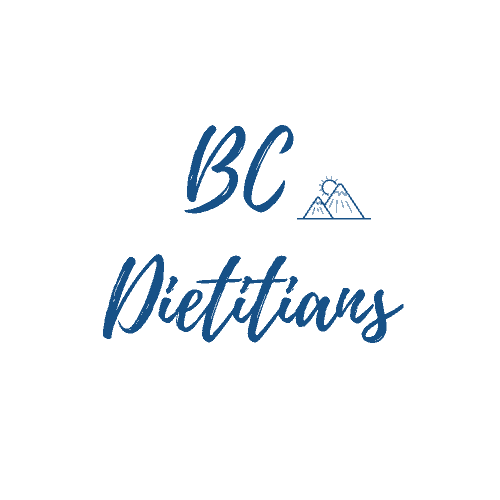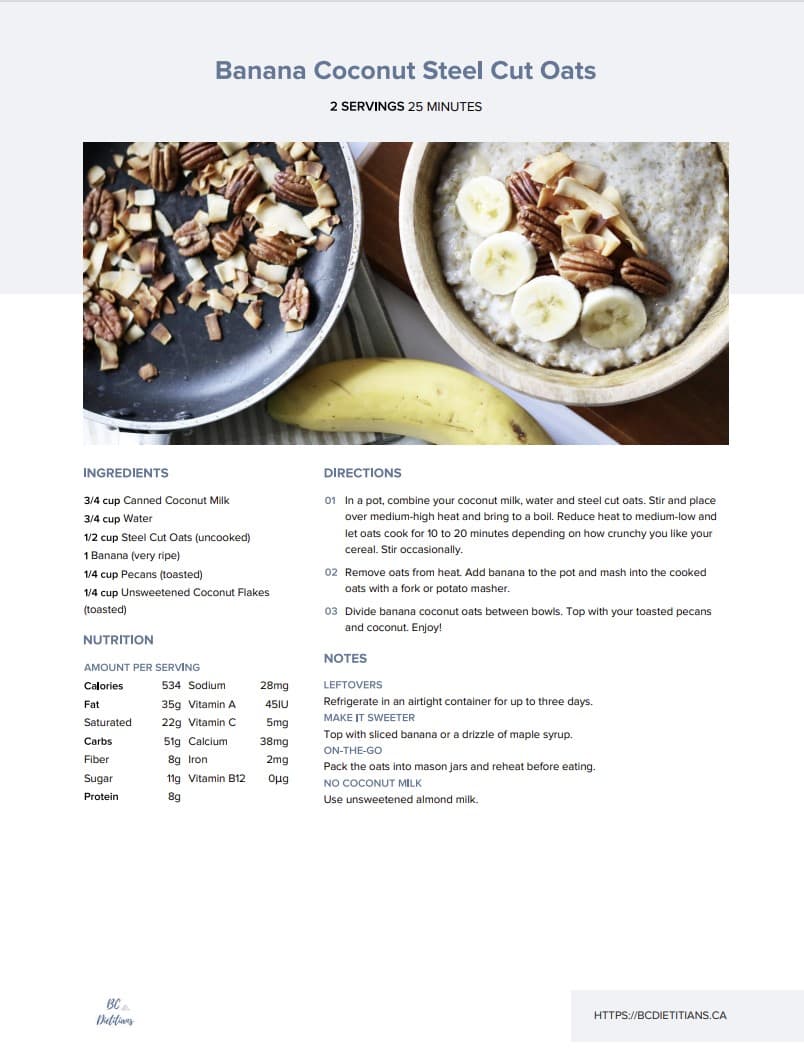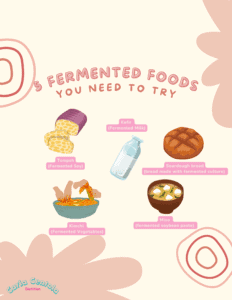This 7-day prenatal meal plan will give you an example of an easy-to-follow meal plan for what and how much to eat to support nutrition throughout a healthy pregnancy.
During pregnancy, it’s essential to focus on foods that are generally well-tolerated as there may be some food aversions or morning sickness that may affect how and what you want to eat.
What is a good meal plan for a healthy pregnancy?
This meal plan aim to provide high-energy, nutrient-rich meals.
Adequate protein intake and small, frequent meals and snacks can help balance blood sugar levels, potentially reducing nausea.
High-fiber foods can also help prevent constipation. Including omega-3-rich foods is crucial to support the baby’s brain development, especially in the third trimester. Additionally, foods high in iron helps prevent iron deficiency anemia, while calcium-rich foods protect bone health.
This meal plan averages around 2000 calories with 15-20% protein, 40-50% carbs, 30-60g fiber and 30-40% fats. For micronutrients, it will provide on average 15mg Iron, 500ug folate and 800mg Calcium daily.
In addition to healthy eating, it is recommend to take a prenatal multivitamin supplement that contains 0.4 mg (400 mcg) folic acid, 16 – 20 mg of iron, vitamin B12, and 400 IU of vitamin D every day.
How to use this meal plan?
The meal plan features 3 main meals and 2 snacks per day.
To make following the plans easier, it also includes a downloadable grocery list and a day-by-day overview that you can print out and put on your fridge or bring grocery shopping.
Many of the meals can be made in large batches and stored well in the fridge – we do recommend making enough for at least 2 days so you can enjoy the leftovers for at least one more meal.
Some meals are shaded out in the meal plan which means they are “leftovers” from a previous day.
How can specific nutrients support a healthy pregnancy?
Iron
Iron needs increase during pregnancy as iron supports the need for extra blood in the system and helps with the growth of the placenta and fetus.
This plan adds in iron-rich food sources such as beef, turkey, beans, oatmeal, and nut butter to help the increased demand for iron in the body. These iron sources are paired with foods that have vitamin C to enhance iron absorption.
Check out this comprehensive Iron-rich food list if you are struggling with getting enough Iron in your diet.
Calcium
During pregnancy, it is important to meet your daily calcium needs to support bone development. This plan helps you reach calcium requirements through foods like cheese, Greek yogurt, fortified milk beverages, salmon, and beans.
Check out this comprehensive Calcium-rich food list if you are struggling with getting enough Calcium in your diet.
Vitamin B12
Vitamin B12 is essential during pregnancy and a deficiency may increase the risk of birth defects such as neural tube defects and may contribute to preterm delivery. This plan helps you reach your vitamin B12 needs from salmon, beef, cheese, yogurt, and eggs.
Folic acid or vitamin B9
Vitamin B9 or as known as folic acid is arguably one of the most essential nutrient in pregnancy.
It plays an important role in cell division and the synthesis of DNA and is essential for the normal development of the spine, brain, and skull of the baby, especially during the first 4 weeks of pregnancy.
After conception, folic acid supports the mother’s expanding blood volume and growing maternal and fetal tissues. For a deep dive into folic acid and pregnancy – get the latest insights on this topic here (for health professionals only)
Since 50% pregnancies are unplanned in North America, all women who could become pregnant are recommended to take a supplement containing 400mcg DFE of folic acid and eat foods rich in folate.
Sources of folic acid include: Leafy greens (spinach, asparagus, okra, broccoli, brussels sprouts, collards, mustard greens), Legumes, nuts and seeds, oranges, papayas, avocados, fortified /enriched breakfast cereal, bread and pasta.
Zinc
Adequate zinc is important during the first trimester when organs are formed, and in the last trimester as the fetus receives zinc from the mother. Zinc may also play a role in assisting in immune system development. Zinc food sources in this plan include beef, pumpkin seeds, chickpeas, and oats.
Fiber
Fluctuating hormones in pregnancy may cause constipation. This plan provides up to 60 grams of fiber daily from fruits, vegetables, legumes, nuts, and whole grains. This plan pairs high fiber foods with protein and fat to keep blood sugar and energy levels stable and prevent constipation.
Omega 3
Health Canada recommends 110-160mg ALA or 2 servings (i.e. total of 150g) per week of cooked fatty fish (salmon, mackerel, herring) which provides 300-450mg DHA per day- this means you can meet your weekly needs in 1 small can of salmon a week (usually 160g)!
ALA sources of omega 3 include: walnuts, flaxseeds, hemp seeds, chia seeds.
Fortified foods like omega-3 eggs omega 3 supports fetal brain and eye development, immune system and reduces inflammation your body can make limited amounts of DHA and EPA from ALA, and it can transfer across the placenta and through lactation.
omega 3 is most particularly important in the 3rd trimester up to infant is 18 months of age for brain development.
What are the foods to avoid during pregnancy?
Food safety risks
There is an increased risk of foodborne illness due to hormonal changes in pregnancy that affect your immune system.
Food poisoning can impact your health (symptoms usually involve nausea, vomiting, diarrhea, fever and chills, stomach pain and cramps), or the health of your baby (risk of miscarriage if in first 3 months of pregnancy, or premature birth). Food poisoning is caused by eating food contaminated by bacteria, viruses or parasites.
You can reduce the risk by taking these 3 steps every time you handle food:
- Clean: Wash your hands and surfaces often with warm, soapy water.
Separate: Make sure to separate your raw foods, such as meat and eggs, from cooked foods and vegetables. - Cook: Always cook food to the safe internal temperature. You can check this by using a digital food thermometer.
- Chill: Always refrigerate food and leftovers promptly at 4°C or below.
There are some foods that naturally are a higher food safety risk.
These foods include deli meats, raw or lightly cooked eggs or foods that contain raw eggs, raw or undercooked meat or poultry, raw or refrigerated smoked seafood, raw or unpasteurized dairy products (soft, semi-soft and blue-veined cheeses), sprouts, pates or meat spreads, unpasteurized fruit juice and cider.
Choose safer alternatives, or cooking the food can reduce the risk of food poisoning.
High Mercury Foods
Mercury can have harmful effects on the nervous system and the developing brain for your baby. Fish with high levels of mercury include: tuna (fresh or frozen; not including canned tuna), shark, marlin, swordfish, escolar, orange roughy.
Health Canada recommends not to eat more than 150g of high-mercury containing fish per month.
Canned Tuna
Canned tuna typically has much lower mercury levels than fresh and frozen tuna since they use younger and smaller fish. The only option you have to pay attention to is the canned albacore tuna, also known as white tuna, which may contain higher mercury levels.
Health Canada advised to limit canned albacore tuna to no more than 300g per week – there are no limits for the other species of tuna such as skipjack, yellowfin, and tongol, which are relatively low in mercury.
Other Concerns
- vitamin A: Limit vitamin A supplements or fish-liver oil supplement, liver / liver products
- caffeine: suggest to limit to 300mg per day (2 cups of coffee or 4-6 cups of black tea)
- alcohol: no amount is considered safe
- some herbal products (usually in supplement or extract forms) – these herbs are considered safe in the amounts commonly used in foods or as herbal tea (2-3 cups per day): ginger, bitter orange/orange peel, Echinacea, peppermint, red raspberry leaf, rose hip, and rosemary.
- soy: limit soy-based supplements
- flax: not to take as supplement
References
- Health Canada. “Food Safety and You – Canada.ca.” Canada.ca, 29 June 2021, www.canada.ca/en/health-canada/services/general-food-safety-tips/food-safety-you.html
- “Mercury in Fish- Consumption Advice: Making Informed Choices about Fish.” Government of Canada, 26 Mar. 2007, www.canada.ca/en/health-canada/services/food-nutrition/food-safety/chemical-contaminants/environmental-contaminants/mercury/mercury-fish.html
- Innis, Sheila, et al. Prenatal Nutrition Guidelines for Health Professionals. Health Canada, 2009. https://www.canada.ca/content/dam/hc-sc/migration/hc-sc/fn-an/alt_formats/hpfb-dgpsa/pdf/pubs/omega3-eng.pdf
- Public Health Agency of Canada. “The Sensible Guide to a Healthy Pregnancy – Canada.ca.” Canada.ca, 2017, www.canada.ca/en/public-health/services/health-promotion/healthy-pregnancy/healthy-pregnancy-guide.html










Add a comment